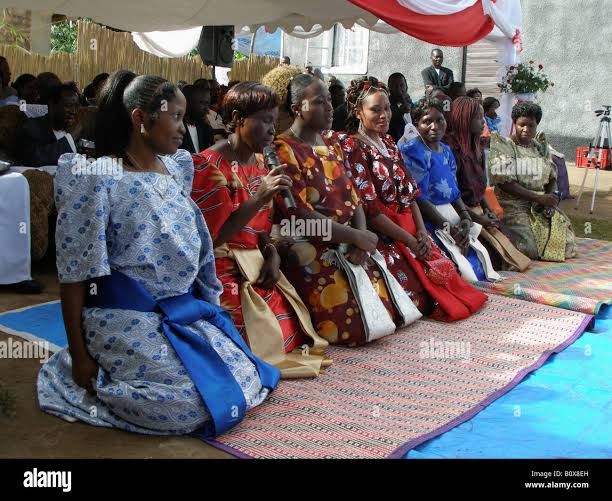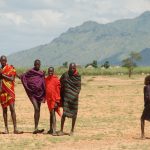The evening air hung heavy over the cracked stoop of Achen’s family hut in Tororo, thick with the earthy scent of sorghum fields stretching into the distance. At just 16, Achen’s world shattered when her father’s voice boomed from inside, a harsh crack against the quiet night. “The dowry is settled, Achen. You marry next month.” The suitor, Okello, a wealthy farmer with a face lined by years and a gaze that made her skin crawl, had bartered cattle and cash for her hand. He wanted a wife to tend his herds and fill his home with children, not a girl with dreams of school or the sketches she doodled in secret. Her mother’s eyes flickered away, a silent plea trapped in the dim glow of their kerosene lamp.
Achen couldn’t sleep that night. She clutched her mother’s Ateso beads, their smooth surface etched with patterns of courage passed down through generations. Okello’s possessive stare from the betrothal meeting replayed in her mind, stealing her breath. At dawn, with her heart thudding like a drum, she packed a small bag—clothes, the beads—and slipped out, the horizon promising a fragile hope. She walked 20 kilometers to her Aunt Rose’s tailoring shop in town, her sandals worn thin by the dusty road. Exhausted, she borrowed a friend’s phone and typed a shaky message: “Forced into marriage at 16. Running for my life.” The post, under @TororoGirl, spread like wildfire—250 likes, 60 retweets—with @WomenRiseUG whispering, “Stay strong, sister!” through the screen.
Aunt Rose’s shop was a sanctuary, alive with the whir of sewing machines and the scent of fresh fabric. “Sew your future,” Rose said, her hands guiding Achen to a clunky machine. Her fingers fumbled at first, the pedal a mystery, but she persisted, threading bold Ateso patterns—spirals of strength, dots of defiance—into a green dress with red accents. When a market woman bought it for 15,000 shillings, Achen felt a spark. “This is my dowry,” she murmured, her voice growing firm. She posted again: “Sewed my first dress today. Freedom stitch by stitch.” @AtesoPride cheered, “Love the patterns! Keep going!”—a boost to her shaky confidence.
Word traveled fast. A trader from Kampala, browsing the market, stopped at her stall, his eyes lighting up at her designs. He snapped a photo and shared it: “Stunning Ateso dresses from a girl in Tororo. Check her out!” Under @KlaFashion, it exploded—300 likes, 70 retweets—drawing orders from Kampala and even Nairobi. Achen stashed every shilling, her sketches piling up with dreams of university.
But peace was short-lived. One afternoon, Okello’s shadow darkened the shop doorway, his men hulking behind him. “You’re mine,” he growled, his voice a threat. Achen rose, beads in hand. “I belong to me,” she shot back, her heart racing but her stance unyielding.The standoff drew a crowd—market women clutching baskets, children peering wide-eyed, Aunt Rose stepping forward. Achen’s dresses, displayed on makeshift mannequins, stood like banners of defiance. She posted in a panic: “Okello came for me. My stitches are my shield. Help me fight!” @UgandaWomen rallied, “We’re with you, Achen!”—350 likes, 80 retweets—and the post went viral. The crowd’s voices rose, drowning Okello’s threats until he slunk away, his pride bruised.
Days later, her father appeared, his shoulders slumped, eyes red. “I needed the dowry for debts,” he confessed, voice breaking. Achen’s chest tightened, love and anger warring within her. “I’ll pay it myself,” she said, showing her earnings—stacks of worn notes from her sales. He nodded, tears falling, and left. She shared the moment: “Faced my father. Earning my freedom.” @RuralVoices replied, “Proud of you, Achen!”—a tentative bridge mending their bond.
Her business blossomed. She hired Nakato and Joy, two girls fleeing similar fates, teaching them to sew. Their designs—merging Ateso and Samia motifs—caught a Kampala boutique’s eye, offering a contract. Achen grinned, posting: “Hired Nakato and Joy. Together, we’re unstoppable.” @KlaStyle enthused, “Can’t wait to stock these!”—400 likes, 90 retweets—a triumph tasted on her tongue.
Trouble brewed beneath the surface. Okello’s family pressured her father, and whispers of a lawsuit circled. Achen called a community meeting under a mango tree, her dresses as proof of her independence. “We’re more than dowry,” she told the women, their nods a chorus of agreement. They formed a support group, pooling shillings to help other girls escape. She posted: “Started a group to free girls from forced marriage. Join us!” @HopeUG called it a “revolution”—320 likes, 75 retweets—a movement taking root.One dusty afternoon, a letter arrived—Okello withdrawing his claim, his family’s name tarnished by the online storm. Achen’s relief was sweet but shadowed by the fight ahead. She sat with Nakato and Joy, stitching under lantern light, their laughter a new melody. She shared: “Okello backed off. But we’ll keep fighting for every girl.” @AtesoQueen praised, “You’ve changed Tororo, Achen!”—350 likes, 85 retweets—a crown of resilience.
The boutique contract brought stability, but Achen’s ambitions stretched further. She enrolled in a tailoring course, her savings funding night classes at a local trade school. The group grew, rescuing three more girls from betrothal traps. Yet, she knew forced marriages lingered in Uganda’s villages. One night, under a sky studded with stars, she wrote: “Learning more to teach more. But when will laws protect us?” @UgLawyer responded, “Advocacy needed. I’m in!”—300 likes, 70 retweets—a call echoing into the darkness.By the mango tree, Achen traced her beads, their patterns a map of her journey.
Her father visited, offering a sack of sorghum as peace. “You’re braver than I knew,” he said, his voice soft. She smiled, her stitches a testament to that bravery. The fight wasn’t over—Okello’s retreat was just one battle—but with each dress, each shared story, she wove a future where no girl would be sold. Uganda’s daughters deserved that freedom, and Achen would keep sewing until they claimed it.
This post was created with our nice and easy submission form. Create your post!





